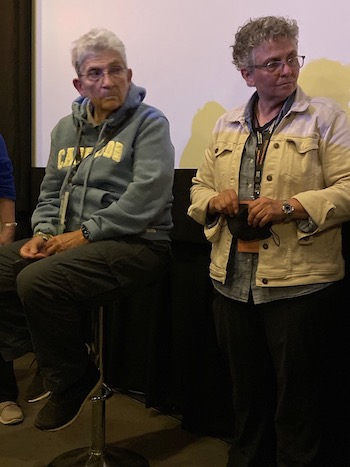Film Review: At the 2022 Provincetown Film Festival
By Gerald Peary
This year, I decided to skip gay films altogether. I got tickets instead for two promising lesbian-themed feature documentaries. An excellent decision.

Cultural anthropologist Esther Newton (left) and filmmaker Jean Carlomusto. Photo: Gerald Peary
No matter one’s sexual inclination, you can only embrace the spirit of the annual Provincetown Film Festival by partaking of the Fest’s specialty, a hefty serving of current queer cinema, both documentaries and fiction. And revivals. The 2022 Festival in June included, on its 50th anniversary, John Waters’s smutty classic Pink Flamingos in a 4K restoration by the Criterion Collection. (Arts Fuse review)
I arrived in P-Town for only the tail end of the Festival, its final day-and-a-half. What queer movies should I watch? In some other years, I’ve been burned a bit by “meet cute” boy-boy sit-coms, so soft, tame, conventional. This year, I decided to skip gay films altogether. I got tickets instead for two promising lesbian-themed feature documentaries. An excellent decision.
The appropriate winner of the Fest’s audience award for Best Documentary was the delightful — and insightful — Esther Newton Made Me Gay. It’s a tribute to a major cultural anthropologist (today’s Margaret Mead?) whose work is too little known by the general public because it has been marginalized by the straight gatekeepers in her field. Instead of studying “The Other” for her work, traveling to Samoa or New Guinea, Newton has stayed home to scrutinize her own gay and lesbian world with pioneering looks at drag queen entertainers in gay night clubs and the summer-life denizens of Fire Island. Unlike many neutral-minded academics, Newton is a cheerleader for the queer life, and mightily opinionated. In one great scene, she is seen at a Susan Sontag-inspired exhibition On Camp at the Metropolitan Museum of Art, accusing Sontag of dishonesty for not making it clear that “camp” is a gay phenomenon.
The title Esther Newton Made Me Gay is much deserved, as we see in a series of moving, enthusiastic interviews with young cultural anthropologists inspired in their vocation by Newton’s sterling example. It’s a fabulous movie, made even more fun by a live Provincetown appearance of its charismatic, outspoken protagonist. Spry in her ’80s, Newton attended with her longtime partner, lesbian-feminist performance artist Holly Hughes. Let me thank the talented filmmaker Jean Carlomusto for choosing to make a documentary about Newton as a follow-up to her well-received Larry Kramer in Love and Anger (2015). After the screening, I walked up to Carlomusto and slipped an idea into her head: why not her next documentary on the legendary lesbian Village Voice dance critic Jill Johnston?
My second lesbian-film choice, Eva Vitija’s Loving Highsmith, was an intelligent, fair-minded look at the controversial novelist Patricia Highsmith, whose reputation has been marred in recent years by disclosures that the late writer was a raving anti-Semite. What can I say? This Jewish journalist is a major fan of her work, having read at least 10 of her superb crime novels. For those who don’t know, Highsmith is the author of, among other books, Strangers on a Train (1950), the heralded Ripley novels, and, under the pseudonym, Claire Morgan, perhaps the first lesbian fiction work with a happy ending. That’s The Price of Salt (1952), made into the 2015 film Carol. (Arts Fuse commentary) Many of her novels have become successful films, starting with Hitchcock’s rendition of Strangers on a Train (1951).

A scene from Loving Highsmith.
And in life? Highsmith was a brooding, often unhappy loner with a series of obsessive crushes on women and a host of stormy love affairs. Happily, the filmmaker of Loving Highsmith tracked down several of her longtime girlfriends for some telling intimate conversations, including with the colorful lesbian pulp novelist Marijane Meaker. The big surprise for me was that Vijita found far more live footage than I imagined existed of Highsmith, this forlorn, reclusive misanthropist.
Not all films at Provincetown were queer-themed. David Siev’s Bad Axe is a brilliant personal documentary about his Midwest Asian-American family, who have resided contentedly in rural Bad Axe, Michigan. But as Trumpism infiltrated the normally tranquil little Republican town, their restaurant business came under racist attack. Siev doesn’t hold back on the family quarrels triggered by being suddenly under siege. And he’s there with his camera for an amazing real-life scene: a confrontation between hooded ultra-rightists and Black Lives Matter protestors on the streets of Bad Axe.
Sarah Jones’s Sell/Buy/Date is a hybrid film: semi-fiction, quasi-documentary. It’s based on Jones’s stage play in which the actress catapults among a series of comic roles — a Hispanic busybody, a nagging Jewish old lady, a hip-hop chauffeur, etc. — while Jones as herself pursues a serious topic. It’s whether the sex trade should be lauded as a place of women’s freedom to choose their profession or condemned as a locus of female danger and male oppression. The movie version — sometimes powerful and probing, often clunky and cutesy — asks the same complex question and comes to a tentative answer. Prostitution should be decriminalized, though the life of a sex worker is often a terrible, frightful, and impoverished one.
Finally, I chose one foreign-language film at Provincetown by an esteemed international filmmaker, Both Sides of the Blade from France’s Claire Denis. Despite starring two much-acclaimed veteran actors, Juliette Binoche and Vincent London, this film is a muddled disappointment, a three-way love triangle in which it is hard to care about any of the indulgent participants (Arts Fuse review). Actor three, now rounded out and middle-aged, was Grégoire Colin, who starred as a comely youth in early Denis. Alas, those Denis films were so much better than her recent work, such as the touching love story, Nénette and Boni (1996), and Denis’s undeniable masterpiece, Beau Travail (1999).
Gerald Peary is a Professor Emeritus at Suffolk University, Boston; ex-curator of the Boston University Cinematheque; and the general editor of the “Conversations with Filmmakers” series from the University Press of Mississippi. A critic for the late Boston Phoenix, he is the author of nine books on cinema; writer-director of the documentaries For the Love of Movies: The Story of American Film Criticism and Archie’s Betty; and a featured actor in the 2013 independent narrative Computer Chess. His latest feature documentary, The Rabbi Goes West, co-directed by Amy Geller, has played at film festivals around the world.
Tagged: Bad Axe, David Siev, Esther Newton, Esther Newton Made Me Gay, Eva Vitija, Jean Carlomusto.
